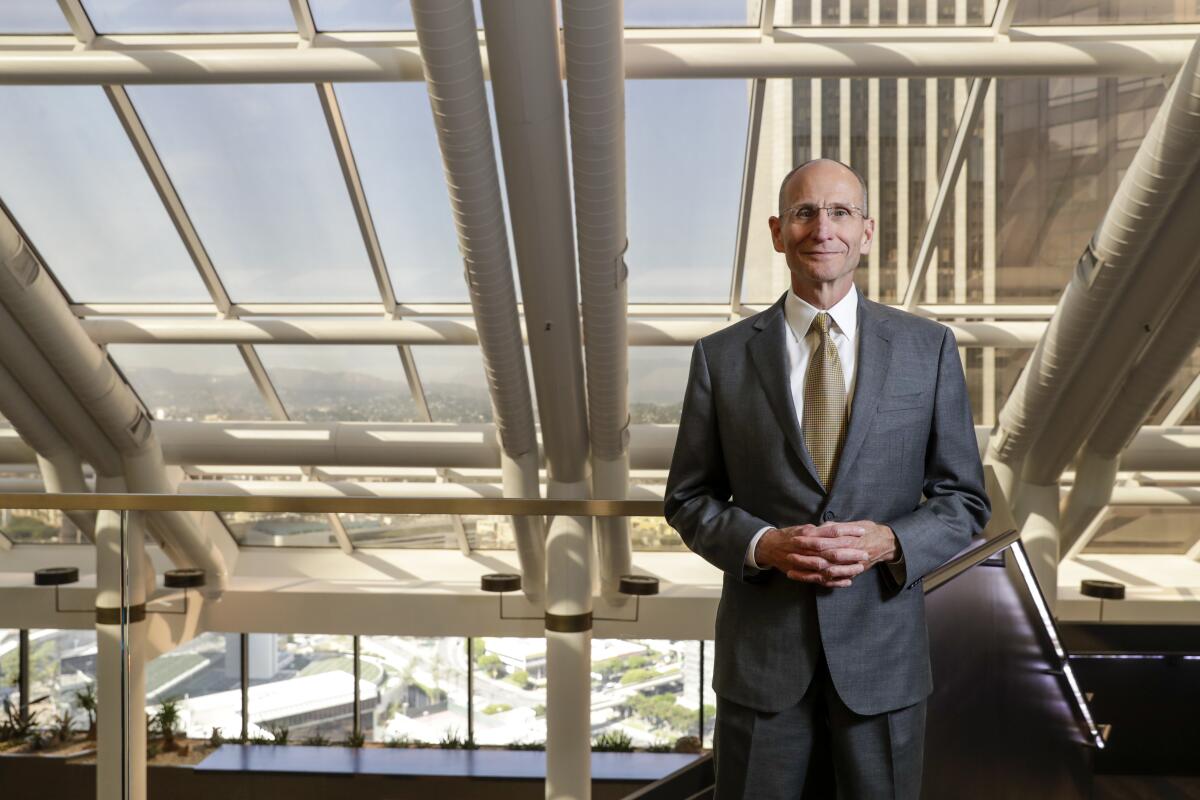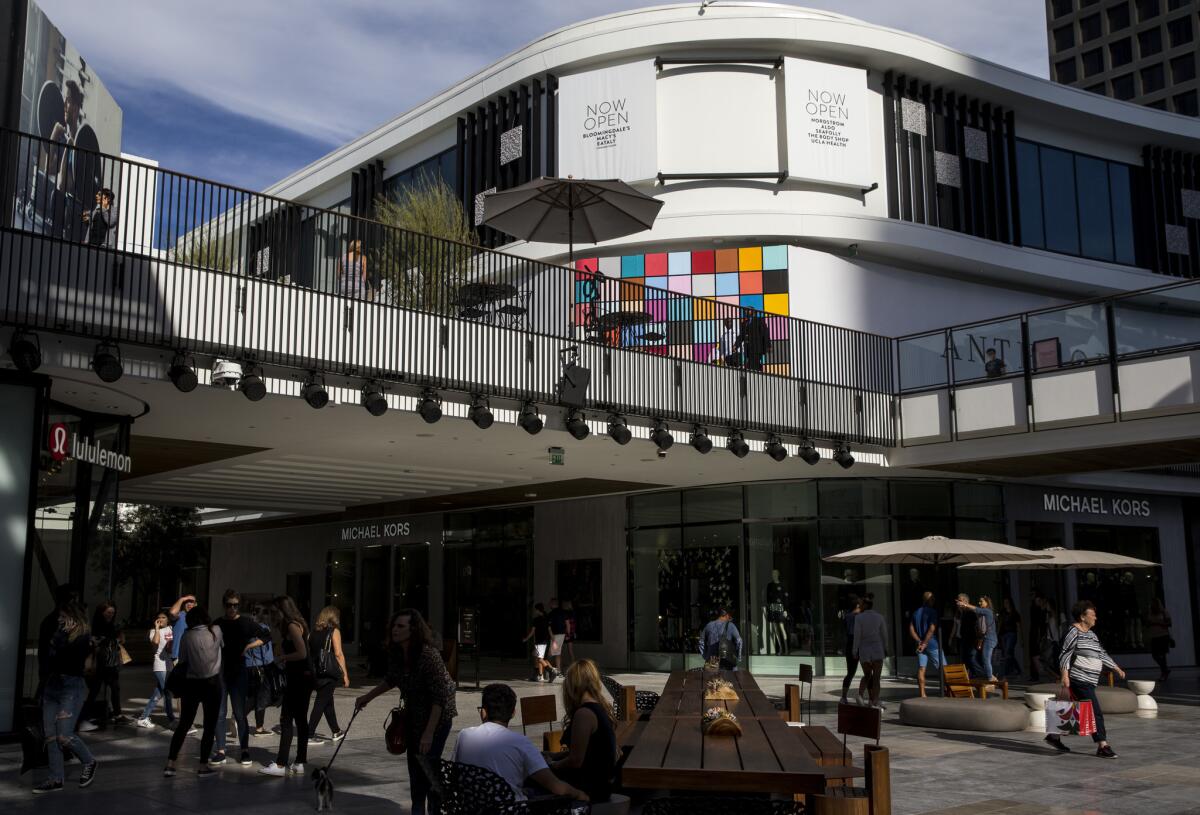This CEO sees growth ahead for the Los Angeles real estate market

The world’s largest real estate services firm, CBRE Group Inc., is one of only a handful of Fortune 500 firms based in Los Angeles.
The company has had a growth spurt since the last real estate downturn ended, posting new revenue records for eight consecutive years and finishing the third quarter with a profit of $257 million.
Los Angeles real estate has been a thriving business during that time, driven in part by substantial investments from financiers in other countries including China, Canada and South Korea.
“For three years in a row, Los Angeles has been the top market in the country for foreign capital,” said Robert Sulentic, chief executive of CBRE. “Foreign investors tend to like the big gateway markets and L.A. has been particularly big because of the entertainment industry.
CBRE, known for decades as Coldwell Banker & Co., makes money on commissions from brokers who arrange sales and leases of offices, warehouses and other commercial property, and by managing real estate for corporations and other property owners. Its other real estate disciplines including investment and development of new properties.
Though it keeps a fairly low profile in its hometown, its more than 90,000 employees have a vast footprint, with clients in more than 100 countries. It counts outposts in such financial centers as New York, London, Paris, Hong Kong, Singapore and Sydney, Australia.
In a recent interview, Sulentic, who grew up in Omaha and graduated from Harvard Business School, discussed his firm’s recent expansions and whether the real estate market is due for a sharp correction, as some fear.

What has prompted investors from other countries to open their wallets for real estate in California and other Western states?
“Los Angeles has been particularly big because of the entertainment industry. California has content producers in the south, and tech in the north. Those are huge drivers of leasing growth and rental growth. Those things attract capital. L.A. is front and center in the massive demand for content creation.”
Do you expect foreign investment to continue, then, at such a torrid pace?
“Some foreign investors are huge and want huge entity deals, like Unibail-Rodamco’s purchase of Westfield in 2018. Those are getting hard to find. Capital controls in China have also been a factor and there is some concern about trade issues between the U.S. and China. The trade situation is making people a little more reluctant to move capital around the world.”
“We think there is going to be a significant drop in foreign investment by the end of the year, maybe by as much as 25%. That’s compared to last year’s investment, though, which was really high.
Does that suggest that the real estate market will cool off? This positive cycle appears to be unusually long.
“A few things are driving it to last so long. The last downturn after the great financial crisis was so brutal that those who could cause a quick boom and bust, like lenders, investors and builders who could use a lot of leverage, have shown more caution. That has resulted in slower, but more extended growth.
“Next year we’ll see slower growth, but some growth. We won’t have a recession and our industry will continue to perform well. The value of real estate assets will likely hold up.”

We’ve seen a lot of shopping centers struggle or even go under in recent years. Does the rise of online shopping mean retail properties will drop in value?
“E-commerce is disrupting retail, but we have the view that retail is definitely not going away. Multi-tenant, institutional-quality rental property is as hot as it’s ever been. But you cannot build that property successfully with pure retail. Gyms, grocery stores, yoga shops, restaurants -- you’ve got to have them. Go to the Grove, the Americana at Brand or Westfield Century City. It’s almost like a downtown, with big shops, little shops, Eataly and Equinox. Retail is simply not going away.”
CBRE launched its own co-working brand Hana this year including an office in Irvine, joining a host of other newcomers in the co-working office market. With WeWork now on the ropes and laying off employees, does that suggest that demand for co-working space has been overestimated?
“WeWork is going to have to work through their challenges. They have a well-known brand. We think the co-working market is going to be there independent of WeWork.
“Today, co-working makes up about 2% of multi-tenant office space around the world, including WeWork and all the small guys. It will grow to as much as 10% over the next decade. Occupiers have learned to use that space to their advantage. They have the ability to move people around the world and move them in quickly.”
CBRE now plans Hana offices in London and you are expanding your development business outside the U.S. for the first time with the acquisition of a multifamily developer in the U.K. Doesn’t the Brexit mess give you pause?
“London is in a category with New York, Tokyo and Los Angeles. It’s a mega city with the stuff people want and a diverse melting pot. London is going to continue to be one of most attractive places in the world.
“I’m not saying it isn’t going to go through a rough patch. But when you hear companies are going to leave London in some kind of mass, where are they going to go? Amsterdam and Frankfurt? Those cities have less than 2% vacancy and are incredibly hard to build in.”
More to Read
Inside the business of entertainment
The Wide Shot brings you news, analysis and insights on everything from streaming wars to production — and what it all means for the future.
You may occasionally receive promotional content from the Los Angeles Times.











